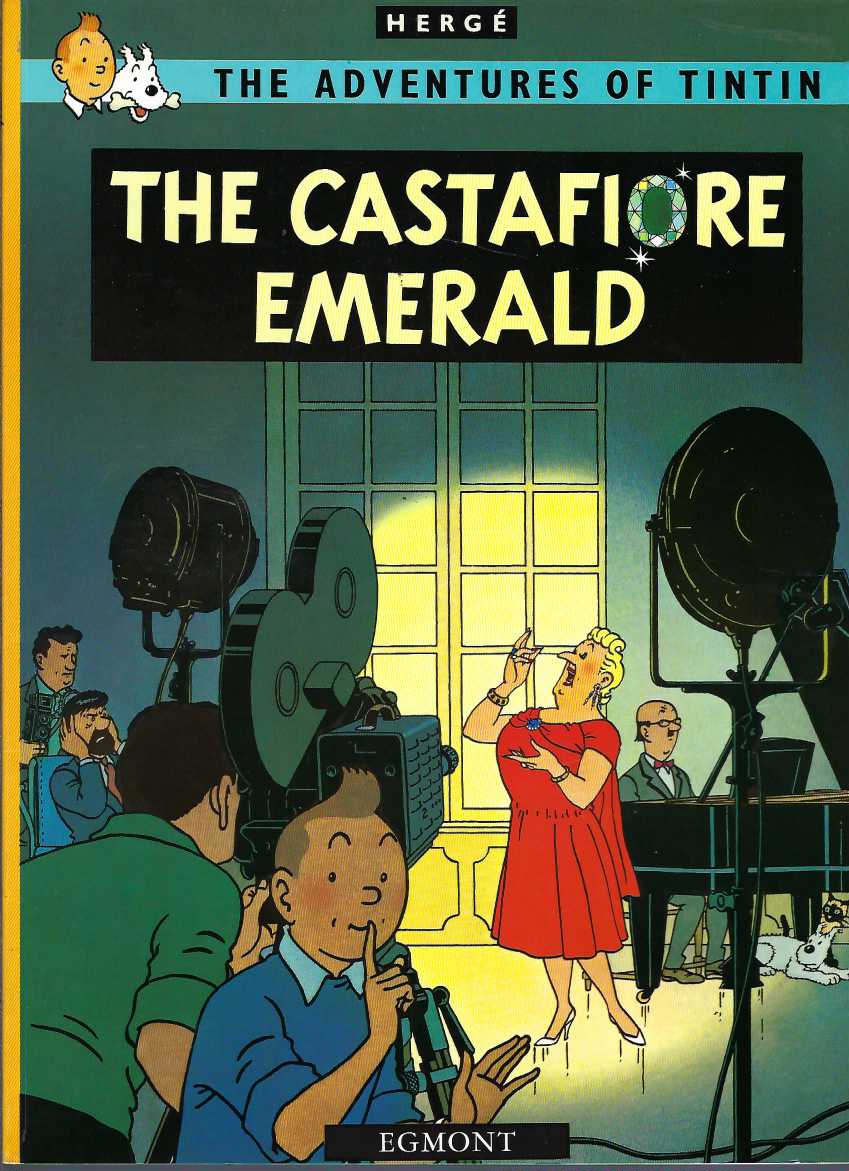The Castafiore Emerald (French: Les Bijoux de la Castafiore) is the twenty-first volume of The Adventures of Tintin, the comics series by Belgian cartoonist Hergé. It was serialised weekly from July 1961 to September 1962 in Tintin magazine. In contrast to the previous Tintin books, Hergé deliberately broke the adventure formula he had created: it is the only book in the series where the characters remain at Marlinspike Hall, Captain Haddock‘s family estate, and neither travel abroad nor confront dangerous criminals. The plot concerns the visit of the opera singer Bianca Castafiore and the subsequent theft of her emerald.
Although The Castafiore Emerald received critical acclaim for its humorous depiction of its characters following a trail of red herrings, it failed to match the commercial success of previous volumes due to the experimental nature of its narrative. It was published as a book by Casterman shortly after its conclusion. Hergé continued The Adventures of Tintin with Flight 714 to Sydney, while the series itself became a defining part of the Franco-Belgian comics tradition. The story was adapted for both the 1991 Ellipse/Nelvana animated series The Adventures of Tintin and the 1992–93 BBC Radio 5 dramatisation of the Adventures.
Tintin and Captain Haddock are walking through the countryside of Marlinspike when they come across a Romani community camped in a garbage dump, and reunite a lost little girl named Miarka with her family there. The Romani explain that they are not allowed to camp anywhere else so Haddock invites them to the grounds of his estate, Marlinspike Hall.[1]
Haddock has been trying to get the local stonemason Arthur Bolt to fix a broken step at Marlinspike, but he is never available. Milanese opera diva Bianca Castafiore invites herself to Marlinspike Hall. Haddock, who dislikes her company, tries to leave before she arrives but trips on the broken step and sprains his ankle. The doctor puts his foot in a cast and imposes bed rest. Castafiore then arrives with her maid, Irma, and pianist, Igor Wagner. Castafiore presents Haddock with a pet parrot and fusses over him, to his great discomfort.[2]
The magazine Paris Flash claim that Haddock and Castafiore are engaged, on the basis of a misinterpreted interview with Professor Calculus. This results in an avalanche of congratulations from Haddock’s friends. A television crew come to Marlinspike Hall to interview Castafiore and a mysterious photographer, Gino, appears with the crew. Suddenly, Irma informs Castafiore that her jewels have been stolen, and Tintin suspects Gino who runs away during a temporary power cut. Castafiore, however, finds the jewel-case which she herself had misplaced. The next day, an angry Castafiore shows Tintin and Haddock a copy of the magazine Tempo di Roma with a picture of Castafiore taken at Marlinspike Hall without her permission, proving that Gino was only a paparazzo.[3]
A few days later, Castafiore’s most valuable jewel, an emerald given to her by the fictional Maharajah of Gopal, goes missing. After initially questioning Irma, Nestor and Calculus, the detectives Thomson and Thompson suspect the Romani. Their suspicions are heightened when they find a pair of golden scissors belonging to Irma in Miarka’s possession, though she claims to have found them. After the Romani depart, the police start looking for them. Tintin also investigates Igor Wagner, whose behaviour he finds suspicious, but finds out that the musician is simply sneaking out to indulge in a horse-gambling habit.[4]
Castafiore leaves for Milan to perform in the opera La gazza ladra (Italian: The Thieving Magpie). Tintin realises that the true culprit responsible for the theft of the emerald and the scissors is a magpie. He explains to Haddock that the scissors must have fallen out of the nest only to be found by Miarka. Tintin retrieves the emerald and hands it to Thomson and Thompson, who return it to Castafiore. Sometime later, Bolt mends the broken step, only for Haddock to inadvertently step on it and slip again while the cement is still wet.
